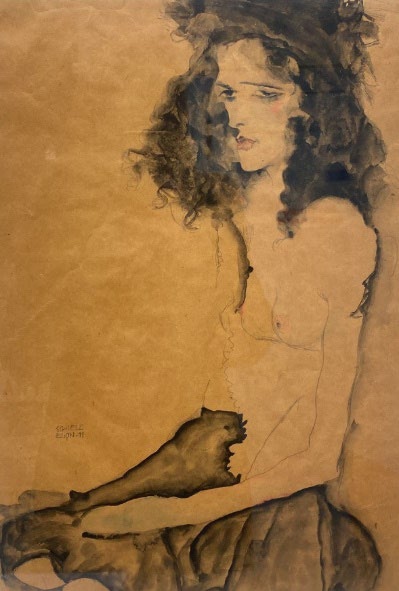Two artworks by the Austrian Expressionist painter Egon Schiele, looted by the Nazis during World War II, have been restituted to the descendants of the family that originally owned them. The return of the pieces, “Portrait of a Man” (1917) and “Girl With Black Hair” (1911), was announced by investigators from the U.S. Department of Homeland Security and Manhattan District Attorney Alvin J. Bragg.
“Girl With Black Hair” was voluntarily surrendered by Oberlin College’s Allen Museum to prosecutors in Manhattan and is now back in the possession of the heirs of Austrian Jewish performer Fritz Grünbaum and his wife, Elisabeth. Fritz Grünbaum tragically lost his life at the Dachau concentration camp in 1941.
The second artwork, “Portrait of a Man,” originated from the Carnegie Museums of Pittsburgh. It was seized by Bragg’s office in September 2023, along with a third piece, “Russian War Prisoner” (1916), from the Art Institute of Chicago. It is not immediately clear whether the latter work has been returned to the family.
This recent restitution follows the return of seven Schiele works in September 2023 and comes just months after a federal judge in Manhattan temporarily halted a lawsuit brought by the heirs against the Albertina Museum, the Leopold Museum, and the government of Austria. Grünbaum’s descendants, Timothy Reif, Leon Fraenkel, and Milos Vavra, initially filed the lawsuit in December 2022, seeking the restitution of 12 works, including “Dead City III,” “Self-Portrait With Grimace” (1910), “Standing Man in Red Shawl” (1913), and “Standing Girl With Orange Stockings” (1914).
The temporary halt in the case was due to difficulties in serving the foreign entities, allowing the heirs to seek assistance through diplomatic channels. This stay provides the plaintiffs with time to involve the U.S. State Department in serving the defendants with the lawsuit.
Fritz Grünbaum amassed an extensive art collection of at least 440 works before his death at Dachau in 1941. Among them were approximately 80 pieces by Schiele, allegedly forcibly handed over to Nazi authorities by Grünbaum’s wife, Elisabeth, during his imprisonment. The family has dedicated nearly two decades to reclaiming these artworks.







